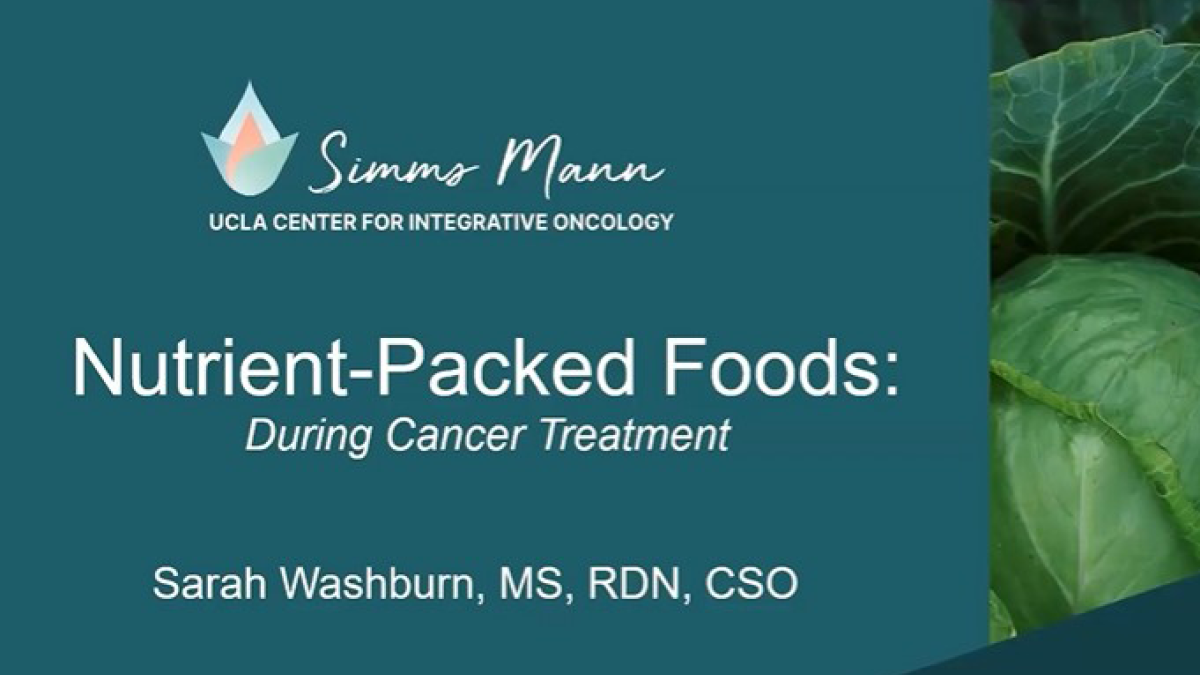Nutrients are essential for life. They provide energy, support the immune system, are vital to cell and nerve function, build and repair tissue, produce enzymes and hormones, support digestion, help maintain fluid balance and boost overall health.
“They remind me a little of oxygen,” says Sarah Washburn, MS, RDN. “They’re pretty valuable to have in our lives.”
Nutrients include larger compounds such as carbohydrates, proteins and fats and smaller compounds such as vitamins, minerals and phytonutrients.
Nutrient-dense foods are important for good health anytime, but especially during cancer treatment, says Washburn, a dietitian with the Simms/Mann UCLA Center for Integrative Oncology who recently hosted a webinar on ways to consume more nutrient-dense foods.
The body needs more nutrients during cancer treatment to help protect healthy cells and destroy unhealthy ones, she says. Chemotherapy, hormone therapy, immunotherapy, surgery and radiation tax the body, increasing its need for nutrients.
Eating nutrient-rich foods supports the immune system, reduces treatment side effects, preserves strength, improves recovery and enhances well-being, Washburn says. However, many people being treated for cancer find their appetite affected. Foods they once loved may lose their appeal.
“Your food preferences can change during treatment,” Washburn says. “Your taste buds can change. Your GI (gastrointestinal) tract can change.”
Though these changes are often temporary, they can reduce an individual’s interest in eating.
The entire gastrointestinal tract is involved in nutrient absorption, Washburn says, so maintaining good gut health is critical. To keep the gut healthy, she recommends eating prebiotic and probiotic foods.
Prebiotic foods are fiber-containing foods such as fruits, vegetables, whole grains, beans, nuts and seeds that feed the gut microbiome. Probiotic foods contain live bacteria that support healthy gut function. These foods include yogurt, kefir, sauerkraut, miso and tempeh.
Washburn advises avoiding probiotic supplements without first talking to your doctor, as some cancer treatments are augmented by taking probiotics and others aren’t. In general, consuming sensible amounts of probiotics through food is safe for most patients, she says.
Another key to gut health is stress management, Washburn says: “If you are running from a tiger or running from one event to another, your cortisol levels are pumped up.” This feeling of “survival mode” sends blood flow away from the digestive tract, leading to less nutrient absorption. It is best to rest and digest during meals, she says.
Choosing nutrient-dense foods
The most nutrient-rich foods are whole foods: single-ingredient foods such as apple, zucchini, broccoli or chicken.
“These foods are in the field. You don’t see a field of doughnuts. You see a field of spinach,” Washburn says. “That’s a whole food. It’s not fortified, it’s not bleached, it’s not highly processed. It’s its own ingredient and it’s prepared to optimize nutrient density.”
One of Washburn’s favorite ways to enjoy a bounty of nutrient-dense whole foods is in hearty soups and stews, which are generally easy to digest. Soups and stews tend to have an umami flavor – a savory taste that studies show can help people with diminished appetite eat more. Soups and stews are hydrating, filling, comforting and convenient, she says. She suggests starting with simple recipes and smaller batches to discover what you like and can tolerate.
“Oftentimes when people don’t have a lot of hunger, a lot of food presented to them – whether it’s in a meal or a big dish of something like a pot of soup – is a little overwhelming and can actually suppress somebody’s appetite,” Washburn says.
For this reason, she also recommends small plates and appetizers. Consider tuna salad or egg salad with crackers, peanut butter and banana on toast, a quesadilla with spinach and tomatoes, or yogurt topped with fruit and seeds.
Another way to optimize nutrients during cancer treatment is to add more herbs and spices to meals, Washburn says: “They are powerhouses of nutrients, even in small amounts.”
She likes to choose an “herb of the week” and finds different ways to incorporate it into foods and drinks. Favorites include turmeric, a powerful anti-inflammatory agent that can be sprinkled onto vegetables, eggs or grains; garlic, which boosts the immune system and is a “fabulous antioxidant” (chop it 10 minutes before incorporating or cooking to allow its enzymes to activate); oregano, which is antibacterial and great in sauces and marinades; and cinnamon, which can be added to yogurt, nuts or coffee and helps regulate blood sugar.
The Simms/Mann center offers nutritional support free for people receiving cancer treatment at UCLA Health. The Center’s library of recorded webinars – on topics including nutrition, cognitive health and sleep, among others – is available on demand.
